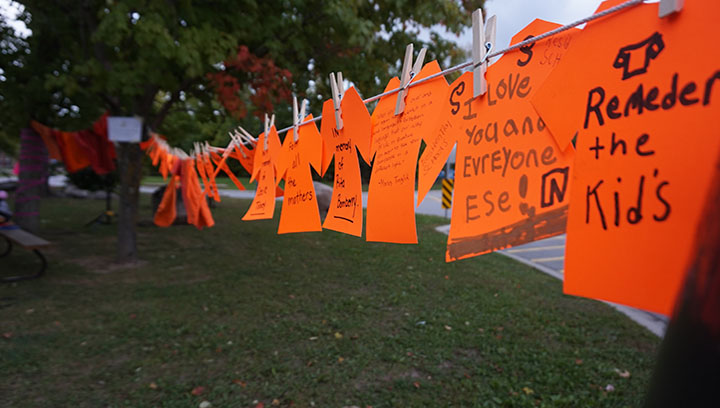Orange Shirt Day: 5 ways to honour Residential School survivors
Sept. 30, 2020

What is Orange Shirt Day?
On Sept. 30, people from across Canada will wear orange shirts in honour of Residential School survivors.
The story behind Orange Shirt Day began in fall 1973.
Six-year-old Phyllis Webstad of Stswecem’c Xgat’tem First Nation was excited for her first day of school. Wearing a brand-new orange shirt from her grandmother, she entered into the St. Joseph Mission Residential School just outside of Williams Lake, B.C.
Shortly after her arrival to the school, she was stripped her of her orange shirt in exchange for the school’s uniform.
The orange shirt taken from Phyllis is symbolic of her experience as well as the experiences of more than 150,000 Indigenous children who had their cultures, identities, and languages stripped from them upon their first days at school.
Wearing orange on this day is a collective commitment to reconciliation, guided by the spirit of healing. Phyllis started the Orange Shirt Society to raise awareness about Residential Schools, the impact of intergenerational trauma on younger generations, and to send this important message: Every Child Matters.
In the spirit of reconciliation, every Canadian should honour Phyllis’ message – on this day and every day!
Live Q&A: Orange Shirt Day
5 ways to honour Orange Shirt Day
1. Explore the Residential School Timeline.
2. Learn more about the Truth and Reconciliation Commission of Canada Explore the findings from the final report and read the Summary of the Final Report. Familiarize yourself with the 94 Calls to Action that call upon all Canadians, governments, churches, and public institutions to move towards reconciliation.
3. Learn more about and share Phyllis’ story:
4. Check out resources about Residential Schools, such as:
FILMS:
– Indian Horse (access through Georgian College’s Library)
– They Came for Us (access through Georgian College’s Library)
BOOKS:
– Up Ghost River by Alexandra Shimo and Edmund Matatawabin
– They Call Me Number One by Bev Sellars
– Dear Canada: These are My Words by Ruby Slipperjack
5. Celebrate First Nations, Métis, and Inuit people by exploring their many achievements and contributions! As important as it is to understand the impacts of colonization on Indigenous people, it is equally important to celebrate Indigenous resilience and cultural resurgence.
Learn more about Indigenous Services at Georgian College.